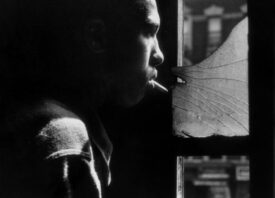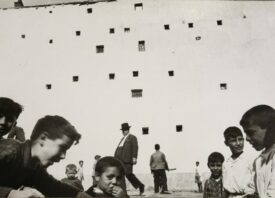Search this site
50 Years Later, The Courage of Gordon Parks

Untitled, Shady Grove, Alabama, 1956. © The Gordon Parks Foundation from the book I AM YOU: Selected Works, 1942–1978 by Gordon Parks, published by Steidl

The Fontenelles at the Poverty Board, Harlem, New York, 1967 © The Gordon Parks Foundation from the book I AM YOU: Selected Works, 1942–1978 by Gordon Parks, published by Steidl
I Am You, the new book of Gordon Parks photographs published by Steidl, The Gordon Parks Foundation, and C/O Berlin, draws its title from a 1967 Life photo essay called A Harlem Family, in which the photojournalist told the story of an African American couple named Bessie and Norman Fontenelle as they worked to feed and clothe their nine children. Parks penned the introduction himself, beginning with the following lines:
“What I want. What I am. What you force me to be is what you are. For I am you, staring back from a mirror of poverty and despair, of revolt and freedom […] There is something about both of us that goes deeper than blood or black and white. It is our common search for a better life, a better world.”
The book, edited by Peter W. Kunhardt, Jr. and Felix Hoffmann, spans the photojournalist’s career from 1942 until 1978. Over the course of those 36 years, Parks documented the speeches of Dr. Martin Luther King Jr., the triumphs and heartaches of Malcolm X, and the rigorous training schedule of Muhammed Ali.
He visited the segregated school he once attended as a child and followed up on the fates of some of his old classmates. He also traveled to Jim Crow Alabama. He photographed the creations of fashion icons like couturier James Galanos, the work of cutting-edge artists, and the forbidden love between film star Ingrid Bergman and director Roberto Rossellini.
The editors of the book offer insights into eighteen of Parks’s most extraordinary projects and essays. The most famous images are included, but with the addition of a few photographs published for the first time as late as 2015, this book gives them new life.
Perhaps Parks’s spirit shines through most brightly in one small anecdote Hoffmann retells in the book’s essay. When his editors at Life wondered if his photos from the Rio de Janeiro favelas were “too depressing” and cut parts of the essay because of it, the photojournalist drafted up a resignation letter. In the end, the magazine agreed to publish a twelve-page spread. In the month following its release, the public donated $30,000 for the family in Parks’s essay. A boy who had bronchial asthma received treatment in Denver, and it probably saved his life.
Parks’s persistence makes us proud in 2017; the photographer loved his country, the world, and its people, and he challenged us to do better. But at the same time, looking at these pictures now comes with a lingering pang and the understanding that not all has been resolved. Those evils he battled— racism, inequality, poverty, violence— remain today.
The words Parks used to conclude the introduction to A Harlem Family in 1967 are as relevant right now, 50 years later, as they were back then:
“Look at me. Listen to me. Try to understand my struggle against your racism. There is yet a chance for us to live in peace beneath these restless skies.”
Find I AM YOU: Selected Works, 1942–1978 here.

Untitled, Shady Grove, Alabama, 1956. © The Gordon Parks Foundation from the book I AM YOU: Selected Works, 1942–1978 by Gordon Parks, published by Steidl

Untitled, Chicago, Illinois, 1950. © The Gordon Parks Foundation from the book I AM YOU: Selected Works, 1942–1978 by Gordon Parks, published by Steidl

Jeweled Cap, Malibu, California, 1958. © The Gordon Parks Foundation from the book I AM YOU: Selected Works, 1942–1978 by Gordon Parks, published by Steidl

Mr. and Mrs. Albert Thornton, Mobile, Alabama, 1956. © The Gordon Parks Foundation from the book I AM YOU: Selected Works, 1942–1978 by Gordon Parks, published by Steidl

Malcolm X Holding Up Black Muslim Newspaper, 1963. © The Gordon Parks Foundation from the book I AM YOU: Selected Works, 1942–1978 by Gordon Parks, published by Steidl

Untitled, London, England, 1966. © The Gordon Parks Foundation from the book I AM YOU: Selected Works, 1942–1978 by Gordon Parks, published by Steidl

Veruschka Models Dress by Pauline Trigère for Vogue, 1965. © The Gordon Parks Foundation from the book I AM YOU: Selected Works, 1942–1978 by Gordon Parks, published by Steidl

Untitled, Washington, D.C., 1963. Cover of the book I AM YOU: Selected Works, 1942–1978 by Gordon Parks, published by Steidl



